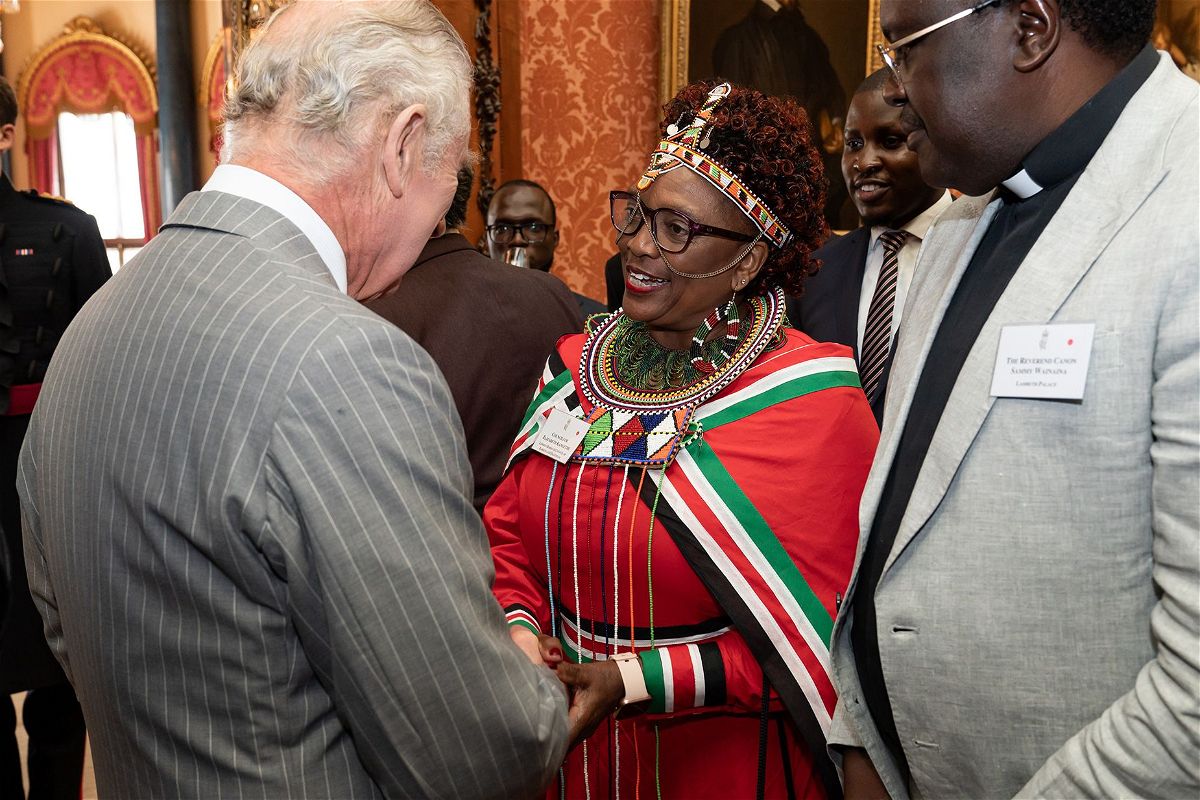King Charles III will confront Britain’s colonial past when he visits Kenya

Charles shaking hands with Kenyan president Jomo Kenyatta at his country home at Gatundi
By Max Foster, Lauren Said-Moorhouse and Rosa Rahimi, CNN
(CNN) — When King Charles III visits Kenya next week, he’ll do something no other member of his family has done in the country.
That’s because, in addition to the usual fare of state banquets and such, he’s planning on acknowledging the “more painful aspects” of shared history between the United Kingdom and Kenya, according to Buckingham Palace.
The four-day visit starts Tuesday and comes as the country prepares to celebrate 60 years of independence from Britain. Charles will be joined by his wife, Queen Camilla.
The Mau Mau uprising – a violent period in which thousands were killed – pushed Kenya toward independence in 1963. It is seen as one of the most brutal episodes of Britain’s imperial past.
The rebellion against British colonialists in Kenya in the 1950s originated from the Kikuyu tribe, the country’s largest ethnic group. As the empire struggled to quell the insurgency in one of its most important colonies, it declared a “state of emergency” and detained as many as 160,000 Kenyans.
It’s also estimated some 90,000 people in custody were tortured, maimed or killed, according to the Kenyan Human Rights Commission. The conditions were so bad that even Britain’s colonial-era attorney-general likened the detention of thousands in the squalid camps to Nazi Germany.
Next week’s royal visit will largely focus on the strong connection between the two countries.
Chris Fitzgerald, the King’s deputy private secretary, said next week’s trip would “celebrate the close links between the British and Kenyan people in areas such as the creative arts, technology, enterprise, education, and innovation.”
He added: “The visit will also acknowledge the more painful aspects of the UK and Kenya’s shared history, including the Emergency… His Majesty will take time during the visit to deepen his understanding of the wrongs suffered in this period by the people of Kenya.”
Days before the royal visit, elders of the Nandi community called for the UK to return the skull of a leader killed in 1905 by the British, Kenya’s The Nation newspaper reported. The skull of Koitalel arap Samoei is believed to be in a UK museum. The elders are also demanding the return of other stolen cultural artefacts as well as compensation for the atrocities that took place against the Nandi community during colonial rule, the local media outlet reported.
In 2013, following a years-long legal battle brought by a group of elderly Kenyans who said they were tortured during Britain’s rule, then-Foreign Secretary William Hague announced a £19.9 million (around $30 million) settlement between the British Government and more than 5,000 Kenyan claimants over human rights abuses, along with the construction of a memorial for victims of torture.
“The British government sincerely regrets that these abuses took place and that they marred Kenya’s progress towards independence. Torture and ill-treatment are abhorrent violations of human dignity which we unreservedly condemn,” Hague said in a statement to the UK Parliament.
While the settlement recognized the suffering and injustice of the period, it fell short of accepting responsibility. “We continue to deny liability on behalf of the Government and British taxpayers today for the actions of the colonial administration in respect of the claims,” Hague added.
Ten years on, Charles will be greeted with a formal reception at the State House in Nairobi. He will engage in bilateral discussions with President William Ruto and other Kenyan government officials and participate in meetings with faith leaders, young individuals and entrepreneurs during his visit.
The trip also marks his first to a Commonwealth member nation during his reign.
Charles succeeded his mother as head of the organization – an association of independent states that emerged out of the ashes of the British Empire. Since 1969, Charles has visited 48 of the 56 Commonwealth countries, most recently Rwanda last year for the Commonwealth Heads of Government Meeting (CHOGM).
While there, Charles recognized that “the roots of our contemporary association run deep into the most painful period of our history” and spoke of his “personal sorrow at the suffering of so many, as I continue to deepen my own understanding of slavery’s enduring impact.”
He followed up those words this year when he expressed his support for research into the royal family’s historical involvement in the slave trade.
Kenya holds a special place for the British royal family. In 1952, then-Princess Elizabeth was staying at Treetops Lodge in the Aberdares mountains when she found out her father had died, and she was to become Queen. Unfortunately, King Charles’ jam-packed schedule during the trip will not permit him to visit the poignant location.
The-CNN-Wire
™ & © 2023 Cable News Network, Inc., a Warner Bros. Discovery Company. All rights reserved.